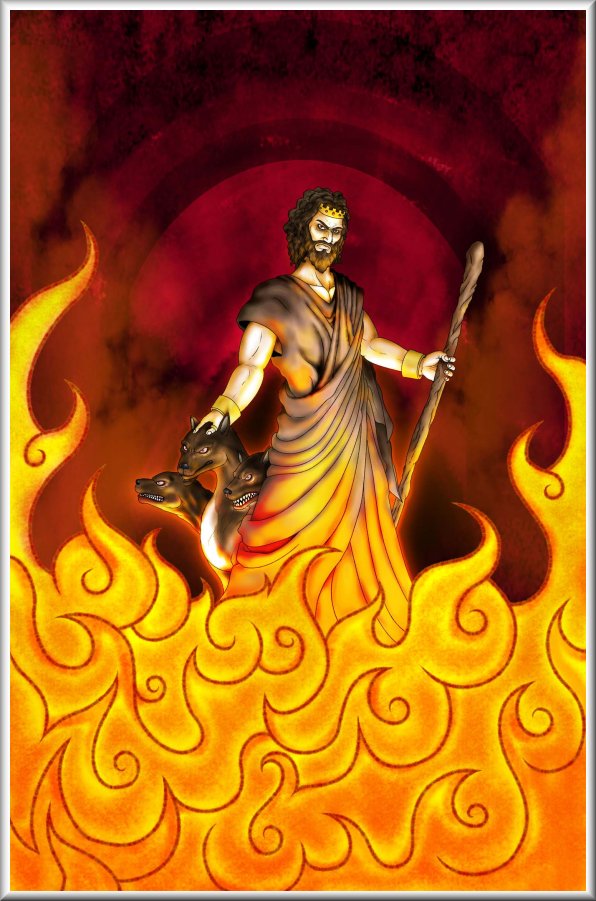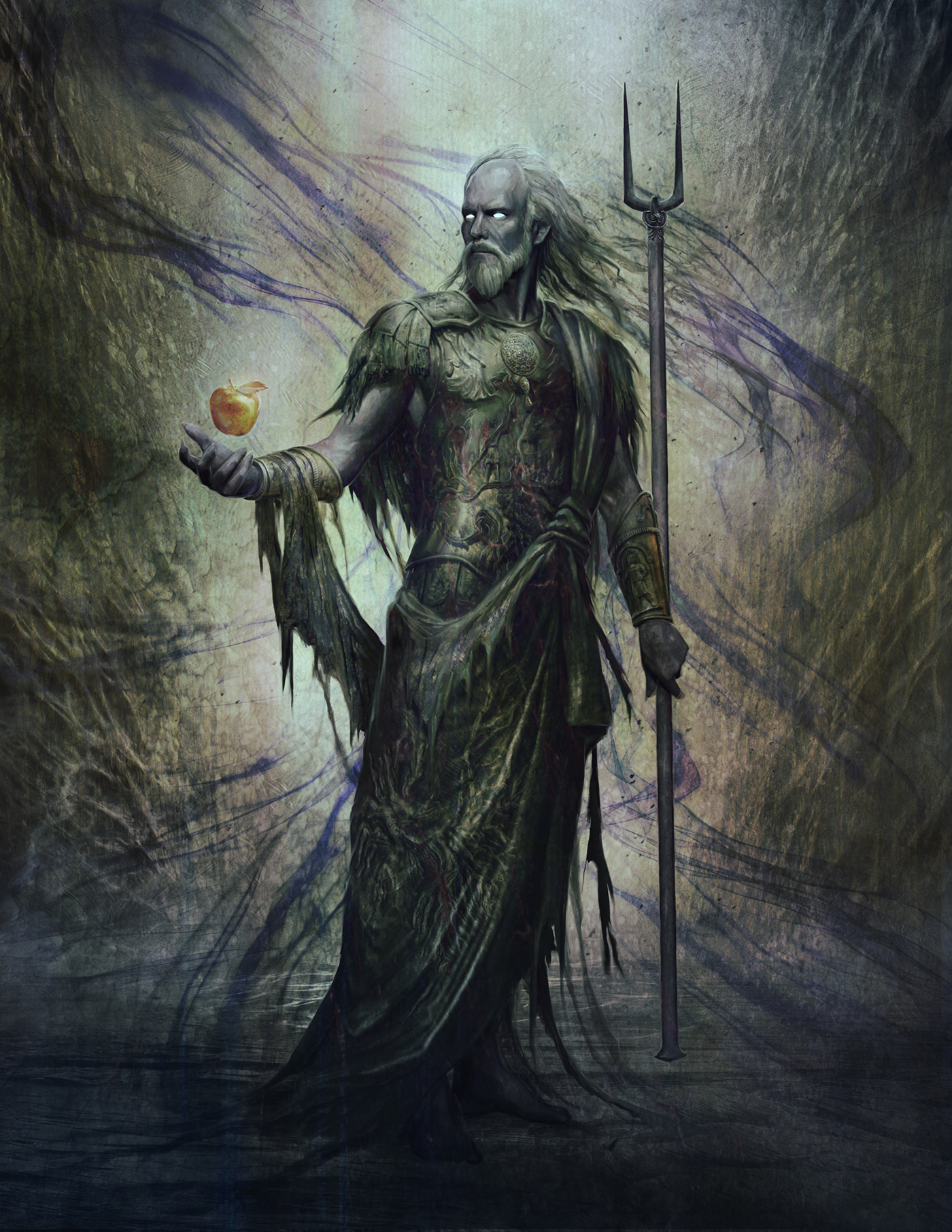Many folks, when they think of ancient stories, often picture figures like Hades, the powerful ruler of the underworld. He was, as it turns out, primarily known as the god of death, and his very name became, in a way, tied to the gloomy place he governed. It's almost like his identity was completely wrapped up in that subterranean world, so much so that when you spoke of one, you really meant the other, you know?
But Hades wasn't just about shadows and endings; he also held sway over riches. In fact, this part of his character, the lord of wealth, sort of grew on its own, eventually blending with the Greek god Hades. So, this Roman counterpart, Pluto, was the master of the world beneath our feet, a place filled with precious metals and gems, quite fascinating if you think about it, as a matter of fact.
The tales spun about Hades, and the beings who shared his shadowy home, are still quite compelling, offering a peek into what people long ago believed. These stories, in a sense, are the true "hades actor descendants," the enduring portrayals that shape our modern appreciation of this ancient figure, passed down through generations of myth-telling, you see.
- Kylie Jenner Boobs Fake
- Halsey Engaged To Avan Jogia
- Keanu Reeves And Cameron Diaz
- Pat Sajak Age
- Yellowstone Actor
Table of Contents
- Biography of Hades the God
- What Was Hades' Role and Influence?
- Who Else Lived with Hades Actor Descendants in the Underworld?
- How Did Persephone Become Tied to Hades Actor Descendants?
- The Family Ties of Hades
- What Was Tartarus and Its Connection to Hades?
- Where Can We Find More About Hades Actor Descendants?
- The Enduring Stories of Hades Actor Descendants
Biography of Hades the God
When you think about the ancient Greek gods, Hades, you know, he often comes across as this really formidable figure. He was, first and foremost, the one in charge of death itself, a pretty weighty responsibility if you ask me. His name, in fact, became so closely linked with the underworld that they were almost interchangeable. It’s like saying "the deep dark" and immediately thinking of his domain, so it is. This powerful deity, born from the primordial god of the sky, Uranus, had a rather interesting origin story, as a matter of fact, his very existence was tied to the cosmic order of things, you see.
Over time, his character, especially the part about him being a god of wealth, started to take on a life of its own. This particular aspect, which focused on the riches found beneath the ground, eventually separated a bit from the main Roman god, Jupiter, and then, rather smoothly, merged with the Greek Hades. So, in a way, he became known as Pluto, the lord of all things subterranean, including the hidden treasures and resources found there. This merging of identities is quite fascinating, showing how beliefs and stories can evolve over the ages, sometimes even blending different traditions together, you know?
- Jordan Smith And Wife
- Zach Bryans Ex Gf
- Marcus Freeman Height
- Neve Campbell Sons
- Baby Clydesdale Budweiser Commercial
He was a ruler of a vast, unseen world, a place where spirits went after life on earth. This makes him a pretty central figure in ancient beliefs about what happens next. His role wasn't just about managing the departed; it also included overseeing the valuable things that came from below the surface, like precious metals. This dual nature makes him a somewhat complex character, not just a simple bringer of doom, but also a keeper of prosperity, which is a bit of a twist, actually.
Personal Details of Hades
For those curious about the specifics of this ancient god, here’s a quick look at some key details, more or less like a bio sketch for a deity, so to speak:
| Detail | Description |
|---|---|
| Primary Role | God of Death, Ruler of the Underworld |
| Associated Title | God of Wealth (as Pluto) |
| Parents | Cronus and Rhea |
| Siblings | Zeus, Hestia, Hera, Demeter, Poseidon |
| Consort | Persephone |
| Domain | The Underworld, subterranean riches |
| Key Myth | Abduction of Persephone |
What Was Hades' Role and Influence?
Hades, you know, had a pretty significant job in the ancient Greek setup. He was, first and foremost, the one who held sway over the entire underworld. This meant he was the chief authority in the land of the dead, a place everyone would eventually go. His name was so strongly connected to this shadowy abode that saying "Hades" often brought to mind the very place itself, not just the god, which is interesting, isn't it?
But his influence wasn't limited to just death. He was also, in a rather unexpected turn, a god of wealth. This aspect, focusing on the precious things hidden beneath the earth, like minerals and metals, actually grew quite distinct from Jupiter's similar association. Over time, it pretty much merged with the Greek god Hades, so he became known as Pluto, the generous provider of earthly riches. This dual nature meant he had a hand in both the ending of life and the abundance found in the earth, a truly unique blend of responsibilities, you might say.
There's a famous story, for instance, where even the mighty Heracles found himself up against Hades. Heracles wanted to take Cerberus, the three-headed guard dog, from the underworld. Hades, being the steadfast ruler he was, refused to let the hero just walk off with his pet, even after Heracles had, in fact, managed to beat the beast without using any weapons. Hades, feeling quite justified in his stance, just wouldn't budge. This made Heracles, who was, you know, understandably quite cross, shoot Hades with an arrow. It just goes to show that even a god of his stature could get into a bit of a tussle, sometimes, and that, in a way, shows his commitment to his duties.
Who Else Lived with Hades Actor Descendants in the Underworld?
The underworld wasn't a lonely place for Hades, not by a long shot. It was, actually, home to several other powerful figures, some of whom were greatly respected, while others were quite feared by the people of old. Among these, of course, was Hades’ own queen, Persephone, who shared his throne and his domain. Their story, as a matter of fact, is one of the most well-known myths associated with this dark place, and it shapes much of what we know about the underworld's inner workings, you know?
Then there were the Erinyes, often called the Furies. These fierce beings, born from the blood of Uranus, the very first god of the sky, were typically thought to make their home in the underworld. They were, you see, the avengers of wrongdoing, especially for crimes against family, and they pretty much ensured that justice, in their own stern way, was served. They lived there alongside Hades and his wife, Persephone, adding a layer of stern, unyielding justice to the shadowy world, so they did.
And let's not forget Charon, the ferryman of the departed. He was the one responsible for carrying the souls of the recently deceased across the river Styx, a pretty important task, honestly. Without his service, a soul couldn't reach its final resting place in the underworld. So, in a way, he was a vital part of the passage from life to what came next, a truly indispensable figure in that shadowy setting, as a matter of fact.
How Did Persephone Become Tied to Hades Actor Descendants?
Persephone, a very important figure in these ancient tales, was the daughter of Zeus, the king of the gods, and Demeter, the goddess of agriculture. She was, naturally, the wife of Hades and, by virtue of that, the queen of the underworld. Her most famous story, which is pretty central to many myths, tells of how Hades, you know, took her away, against her will. He then, rather cunningly, tricked her into eating some pomegranate seeds while she was with him. This act bound her to the underworld for a portion of each year, a pretty clever move on his part, actually.
This tale explains the changing seasons, a pretty neat way to connect the divine world with the natural one. When Persephone is with Hades, her mother, Demeter, grieves, causing the earth to become barren and cold, creating winter. When she returns to the surface, Demeter rejoices, and the earth blooms with life again, bringing spring and summer. So, her connection to Hades isn't just a personal story; it's a cosmic explanation for the very rhythm of the world, you know, a pretty deep tie, honestly.
The Family Ties of Hades
Hades, as it turns out, was part of a pretty significant family, one of the original children of the Titans Cronus and Rhea. His siblings included some of the most well-known gods in the Greek pantheon: Zeus, who became the ruler of Mount Olympus; Hestia, the goddess of the hearth; Hera, the queen of the gods; Demeter, the goddess of the harvest; and Poseidon, the lord of the seas. So, he was, in a way, part of the core group that reshaped the cosmic order after the Titans, you see.
Before they could take their place, though, there was a bit of a family drama. Cronus, their father, had, in fact, swallowed his children as soon as they were born, fearing that one of them would overthrow him, just as he had overthrown his own father. But Zeus, who escaped this fate, eventually forced Cronus to bring up the other children—Hestia, Hera, Demeter, Hades, and Poseidon—whom Cronus had, you know, swallowed. This act of liberation was a pretty big deal, setting the stage for the Olympian gods to take charge and establish their rule, so it was.
Among these siblings, Demeter held a particularly close connection to Hades, though perhaps not in the way she would have wished. Her most famous daughter was Persephone—who became, as we discussed, the bride of Hades. This family connection, forged through marriage, brought the goddess of agriculture directly into the affairs of the underworld, creating a bond that shaped many of the ancient myths, actually, and it's a rather central part of their shared history.
What Was Tartarus and Its Connection to Hades?
Below the earth, even deeper than Hades’ own underworld, was a very dark and ancient place called Tartarus. It was, you know, a primordial landscape, a sort of abyss where only a handful of sinners and the most hated enemies of the gods were kept. This wasn't just a part of the underworld; it was a separate, even more terrifying, part of the cosmos, a place of ultimate confinement and punishment, so it was, truly a place of deep dread.
Zeus, for example, cast his defeated foes, the Titans, into Tartarus after the great war between the gods and the Titans. This act solidified his rule and showed the sheer might of the new Olympian order. So, while Hades governed the general underworld, Tartarus was a special kind of prison, reserved for the most dangerous and powerful beings who had defied the gods. It was a place of eternal torment and a symbol of divine retribution, a pretty serious spot, as a matter of fact.
This distinction is quite important because it shows that Hades’ domain, while vast and powerful, wasn't the absolute lowest point. Tartarus was a place of even greater darkness and despair, a truly bottomless pit. It highlights the layers of the ancient Greek cosmos and the different types of fates that awaited various beings, depending on their actions and who they angered, which is a pretty intricate system, you know.
Where Can We Find More About Hades Actor Descendants?
For anyone interested in learning more about Hades and the rich tapestry of ancient stories that surround him, a good place to look is Mythopedia. It’s, you know, a pretty comprehensive online spot for digging into ancient mythology. This resource covers everything from the Greek and Roman tales to Celtic, Norse, Egyptian, and many other mythologies. It's a great way to explore the enduring presence of figures like Hades and how their stories have been passed down, almost like a lineage of narrative, you see.
This kind of resource helps us connect with the "hades actor descendants" in a broader sense—not just people who played him, but the very stories and characters that continue to influence our culture. It’s a place where you can find out about Hades’ family, like his sister Demeter, and her most famous daughter, Persephone, whose story is, as we mentioned, deeply intertwined with Hades. It also explains how Zeus, for instance, played a part in shaping the world Hades lived in, by casting his defeated foes into Tartarus, so it does.
So, if you’re looking to truly understand the influence and lasting impact of these ancient figures, and how their narratives continue to be told and retold, places like Mythopedia are incredibly valuable. They help us appreciate how these myths, in a very real sense, are the descendants of the original tales, carrying their essence forward through time for new generations to discover, which is quite wonderful, actually.
The Enduring Stories of Hades Actor Descendants
So, we’ve taken a look at Hades, the powerful god of death and wealth, who ruled the underworld and was, you know, quite a central figure in ancient beliefs. We talked about his family, like his siblings Zeus and Demeter, and his wife, Persephone, whose abduction by him is a truly famous tale. We also touched upon other figures in his shadowy domain, like the Erinyes and Charon, and even the deeper, darker pit of Tartarus where Zeus confined his enemies. All these stories, really, make up the rich heritage of Hades, showing how his character and the events surrounding him continue to be a source of fascination, passed down through the ages, you see, a true legacy of narrative.
- Matlock Cast
- What Does Grapes Under The Table Mean
- Ben Shelton Olympics
- January 13 Horoscope
- Khloe Kim Kourtney Kardashian


